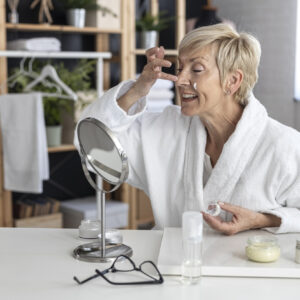Keep It Simple: Summer Skin Care Routines

Keep It Simple: Summer Skin Care Routines
June 28, 2023
In the lazy, hazy days of summer, the last thing you want is to fuss over applying skincare on your face. You want a skincare routine that’s easy to implement, doesn’t require too many products, and takes care of the essentials whether you’re on the go or just in your backyard. While sun protection is essential (really it’s essential throughout the year), you’ll also want a routine that gently cleans up the sweat and dirt from summertime activities while addressing whatever aspects of aging you’re concerned about in your facial appearance.
You might think this is “an easy ask,” and any beauty editor or skin care expert should be able to give you the goods. Even a sophisticated computer “bot” should be able to tell you what to do with a few simple sentences of explanation. Well, it seems going the “bot” route may be confusing and costly. In a recent post, writer Julia Pugachevsky asked ChatGPT to give her an anti-aging routine and what she got was “overwhelming and unhelpful,” including a 12-step routine that would set her back $250.00. Clearly, when you want simple, asking an artificial intelligence computer program is not the way to go.
So how to find a simple yet effective summer skincare routine? You may want to take a look at the real-life routine of expert beauty writer Valerie Monroe (of the website and Substack newsletter How Not To F**k Up Your Face) whose routine consists of some simple, easily accessible products including a tinted moisturizer, retinol, sunscreen, and a regular moisturizer. To really boil it down to essentials, take a look at this recent post from the Cleveland Clinic, which recommends 5 essential products, none of which require a prescription or big budget: a gentle cleanser, a vitamin C serum, retinol, moisturizer, and of course, sunscreen. That’s all you really need to keep your skin clean, collagen boosted, lines and wrinkles addressed, and skin moist and protected from the harmful UV rays of the sun. It’s not a matter of more is better. Rather, it’s a matter of what you are able and willing to do on a daily basis, and how patient you can be to see the results. As skin expert Samantha Stein makes clear, “Skin care is more of a marathon than a sprint. Undoing years of aging won’t happen overnight.” It helps to also maintain more general healthy aging practices, such as exercising, keeping a good diet, managing your stress levels, staying hydrated, and getting enough sleep. If the inside isn’t good, your skin outside isn’t likely to look its best.
Of course, the most important aspect of your summer routine is the sunscreen. No matter what else you do, if you expose your skin to the damaging rays of the sun, the damaging effects will be hard to undo, not to mention increase your risk of skin cancer (90% of skin cancers are linked to UV radiation from the sun). Some essential advice before you consider brands: Be generous with the application, on both your face (about a teaspoon’s worth) and body (about a shot glass worth); SFP 30 will block 97% of the rays, which is about as good protection as you can ask for- above that, you’re just paying more for the same protection; clouds won’t protect you from UV rays- the sunscreen should be on every day, no matter what you do, and should be reapplied; Don’t expose your sunscreen bottle to heat, as it will degrade the ingredients, and start fresh with a new bottle each summer, as the active ingredients will deteriorate over time. Also, make sure you have UV-blocking sunglasses (sun exposure can damage eyes) and a wide-brimmed hat for UV protection. Finally, don’t forget your lips- there are special lip balms that also contain UV protection.
When it comes to what brand to buy, that’s certainly an individual choice. The beauty site Allure just posted the best sunscreens for mature skin, so you may want to check that out. Or, you may decide this year that it’s time to switch from a chemical sunscreen to a mineral sunblock. What’s the difference you ask? A chemical sunscreen (which has been the norm until recent years) is absorbed into the skin to dissipate UV rays. There are some concerns about how safe this absorption is. In contrast, a mineral sunblock forms a physical barrier on your skin to block UV rays, without your skin absorbing the lotion. You may recall in years gone by, lifeguards often had white strips of zinc on their noses. That’s a mineral sunblock, though today’s choices are much more refined without leaving a residue on your skin. Mineral sunblocks are also considered better if you’ve got sensitive skin (and who doesn’t as an older adult?)- and to top it off, they’re better for the ocean environment. For a list of some of the best mineral sunscreens out there, grab your beach towel and read here.







